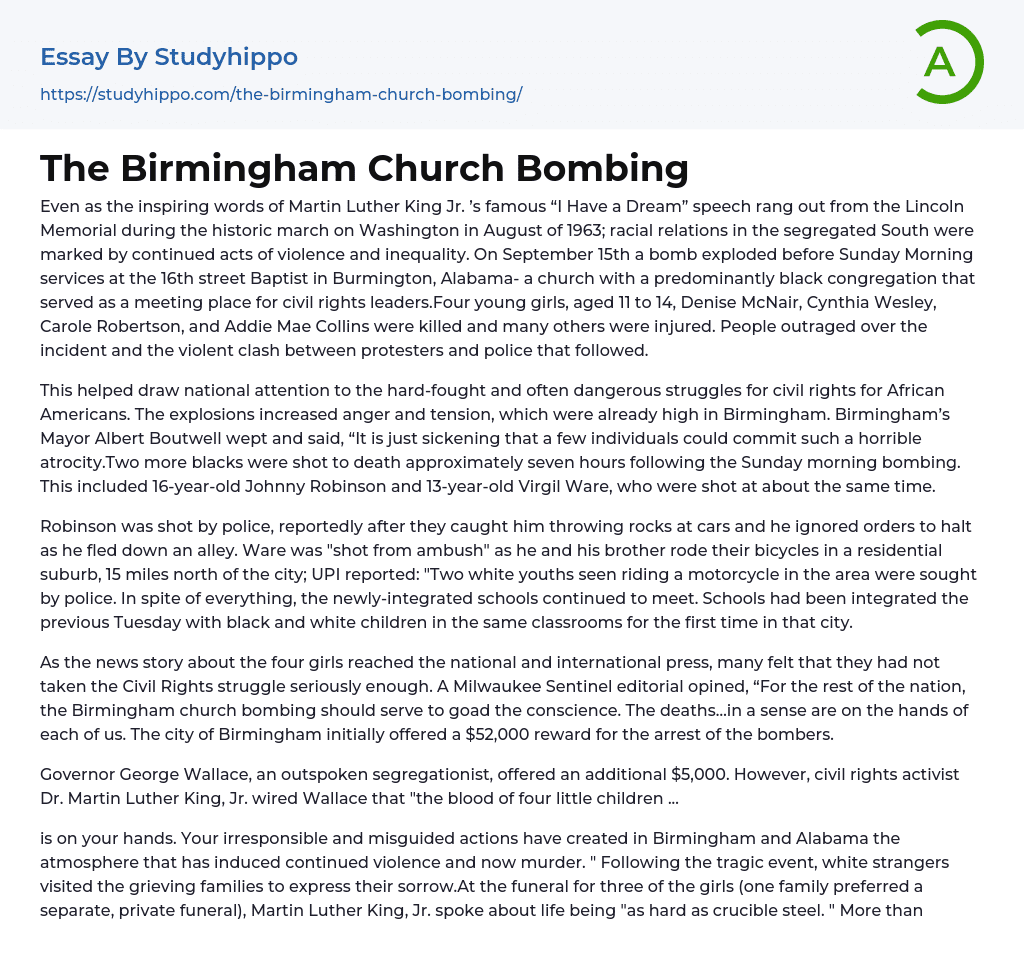Despite the impactful words of Martin Luther King Jr.'s "I Have a Dream" speech during the historic march on Washington in August 1963, racial inequality and violence persisted in the segregated South. Sadly, tragedy struck on September 15th of that year when a bomb exploded before Sunday morning services at Birmingham, Alabama's 16th street Baptist church - a meeting place for civil rights leaders with a predominantly black congregation. This devastating incident resulted in the deaths of four young girls aged between 11 and 14: Denise McNair, Cynthia Wesley, Carole Robertson, and Addie Mae Collins. Additionally, many others were injured. The aftermath caused widespread outrage among people and sparked violent clashes between protesters and police.
This created national awareness of the challenging and hazardous battles for the civil rights of African Americans. The bombings ampli
...fied existing anger and tension in Birmingham. Mayor Albert Boutwell was moved to tears and expressed his disgust, stating, "It is just sickening that a few individuals could commit such a horrible atrocity." Tragically, two additional African Americans were fatally shot roughly seven hours after the bombing on Sunday morning, including 16-year-old Johnny Robinson and 13-year-old Virgil Ware who were both shot simultaneously.
Robinson was shot by police after he was caught throwing rocks at cars and tried to escape down an alley despite orders to stop. Meanwhile, Ware was biking with his brother in a suburban area 15 miles north of the city when he was unexpectedly shot. UPI reports suggest that police were searching the area for two white youths on a motorcycle. Despite these events, integrated schools continued to operate as usual, with black and white students sharing classrooms fo
the first time in that city on the previous Tuesday.
It was widely believed that the Civil Rights movement had not been given proper attention by national and global media. This sentiment increased when news of the four girls killed in Birmingham emerged. The Milwaukee Sentinel's editorial declared that the church bombing should serve as a wake-up call for everyone's conscience, with each person carrying some responsibility for the tragic deaths. Initially, Birmingham offered a reward of $52,000 to catch those responsible.
Adding $5,000, Governor George Wallace, who strongly supported segregation, made an offer. Nonetheless, civil rights advocate Dr. Martin Luther King Jr. sent a message to Wallace stating that, "the blood of four little children ..."
You are responsible for the atmosphere of continued violence and murder in Birmingham and Alabama due to your misguided and irresponsible actions. After the tragic event, white strangers visited the grieving families to offer condolences. Martin Luther King Jr. spoke about the challenges of life at the funeral for three of the girls (one family held a separate, private funeral). Over 8,000 mourners, including 800 clergymen of all races, attended the service.
The absence of city officials did not prevent the bombing from increasing global backing for the civil rights movement, which advocated for equal treatment regardless of race. Consequently, President Lyndon Johnson enacted the Civil Rights Act of 1964 on July 2nd that granted African Americans legal equality. Robert Chambliss and Thomas E., among two other individuals, were recognized as potential culprits by FBI agents who conducted a thorough investigation and obtained compelling evidence.
In 1965, a Bureau report identified Robert E. Chambliss, Bobby Frank Cherry, Herman Frank Cash and
Thomas E. Blanton Jr., all members of the KKK, as strong suspects in a case. However, witnesses declined to provide testimony and no tangible evidence was found.
In the 1960s, court limitations prevented the use of surveillance evidence resulting in no federal charges despite gathered information. Despite being found guilty for creating explosives, Chambliss evaded responsibility for murder. However, in 1971, Alabama's Attorney General William Baxley reopened the case and gained witness confidence to testify with FBI evidence supporting his inquiry.
As a student at the University of Alabama in 1963, the prosecutor became aware of the bombing and felt a desire to take action. In 1977, Robert "Dynamite Bob" Chambliss, who had been part of the Ku Klux Klan, was charged with and found guilty of first-degree murder in Denise McNair's case as well as all four girls' murders. Chambliss received a life sentence but passed away eight years later while serving time in prison. Thomas E. Blanton Jr.
In 2001, Blanton, a former member of the Ku Klux Klan, was sentenced to life imprisonment for four counts of murder. Bobby Frank Cherry, who had also been a member of the KKK in the past, was accused in 2001 but his trial was postponed indefinitely due to an assessment that found him mentally unfit. Herman Cash died in 1994 without ever facing charges.
In 2002, he was convicted and received a life sentence. Subsequently, he passed away in 2004.
- Animal Cruelty essays
- Law Enforcement essays
- Juvenile Justice System essays
- Surveillance essays
- Forensic Science essays
- Crime Prevention essays
- Criminal Justice essays
- Criminology essays
- Drug Trafficking essays
- Juvenile Delinquency essays
- Organized Crime essays
- Penology essays
- Prison essays
- Property Crime essays
- Punishment essays
- Serial Killer essays
- Sexual Offence essays
- Victim essays
- Crime scene essays
- Punishments essays
- Charles Manson essays
- Juvenile Crime essays
- Piracy essays
- Stealing essays
- Gang essays
- Hate Crime essays
- Homicide essays
- Damages essays
- Murder essays
- Robbery essays
- Ted Bundy essays
- Prostitution essays
- Violent crime essays
- Rape essays
- Identity Theft essays
- Sexual Harassment essays
- Distracted Driving essays
- Drunk Driving essays
- Detention essays
- Sexual Assault essays
- Sexual Assault on College Campuses essays
- Cyber Crime essays
- White Collar Crime essays
- Fur essays
- Federal Bureau Of Investigation essays
- Fire Department essays
- Criminal Justice System essays
- Commitment essays
- Mass Incarceration essays
- Kill essays




